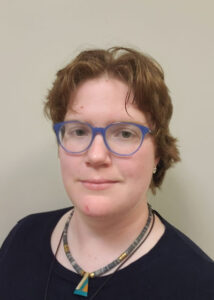 What is your thesis topic?
What is your thesis topic?
Fiber alignment and mesostructure play a key role in tailoring the anisotropic properties of carbon fiber reinforced polymer composites (CFRC) for use in automotive applications. My dissertation topic focus is to develop novel non-invasive methods for characterizing the effect of composite manufacturing processes on micro/meso structure and relation of the resulting structure to mechanical properties.
How is materials processing involved in your research?
Discontinuous CFRCs are susceptible to fiber misalignment during high-throughput molding and manufacturing methods such as compression molding using sheet molding compounds. How the partially cured material is placed into the mold or the length of the molding time can affect how the fibers flow and orient around the part geometry. I am developing a novel non-destructive evaluation (NDE) method called thermal digital image correlation (TDIC) to determine the preferred fiber orientation that results in the part during manufacturing. I seek to develop a set of guidelines, confirming against TDIC, on how to process the uncured composite material during molding to reduce or control fiber misalignment. I am also exploring the use of thermography for identifying defects such as pores or resin rich regions.
Provide an example of where the material, process, or properties you are studying might find an application.
A good example of where my research might find an application in the field is in quality control of composite automotive parts. Discontinuous composites offer a low-cost composite solution for light-weighting for fuel efficiency, corrosion resistance, and energy absorption through crushing. However, due to the material’s susceptibility to misalignment during molding to complex shapes, a rapid quality control method is needed to evaluate parts in development and during full-line manufacturing. Refining the TDIC method and using it to develop guidelines for processing discontinuous composites during molding will allow for the expanded use of discontinuous CFRCs for complex molded structural components of automobiles and infrastructure.